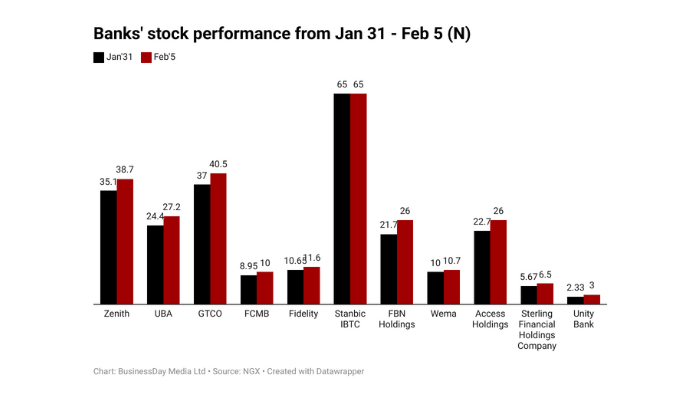Bank stocks defy concerns over foreign currency exposures

Many banks’ stocks have not slowed their rally since the Central Bank of Nigeria (CBN) imposed stringent limits on their Net Open Position (NOP) regarding foreign currency exposures, both on and off the balance sheet.
Tracking Tier-1 and Tier-2 banks stocks performance shows they are not losing steam yet despite concerns that the new regulatory directive which became effective on February 1 could lead to intensified sell-offs across banking stocks.
“Given the established implications to the economy and particularly to the banks, we recommend that: Investors particular about capital gains should take profit on banking tickers in bid to reposition,” according to Meristem research analysts in a recent note.
According to them, “Long-term investors with objective to benefit from dividend payments should hold their positions. Also, investors that took long position at higher-than-current price can accumulate to lower their average cost.
“Interested and potential investors can consider taking long position on the banking tickers with attractive upside potential” Net Open Position is the difference between a bank’s foreign currency denominated assets and its foreign-currency denominated liabilities.
When a bank has higher FCY assets than FCY liabilities, it is said to be in a long position while it is in a short position when its FCY assets are less than its FCY liabilities. For banks in long position, a devaluation of Naira should typically result in FX revaluation gains and vice versa.
“Whilst banks would be able to keep their FX gains made thus far, this policy puts an end to future prospect for FX gains and may begin to reflect on the valuation of banks stocks going forward,” Abiola Rasaq, former economist and head investor relations for United Bank for Africa Plc told BusinessDay.
He said, “This policy brings an end to what some would refer to as ‘abnormal profit’ of banks arising from foreign exchange gains, as banks are going forward expected to either square out their foreign currency open position or have a short position, which would mean having more foreign currency liabilities than assets. Indeed, the allowance to have a 20percent short open position is an incentive for any bank which believes Naira is undervalued to raise foreign currency liabilities and step it down to Naira, with hope of making gains from such strategy when Naira appreciates in the future”.
Meristem research analysts further noted that “Banks (like UBA, FBNH, GTCO, and ZENITHBANK) that benefitted significantly in 2023 through robust FX revaluation gains are not expected to record the high gains in 2024 Net Open Position is the difference between a bank’s foreign currency denominated assets and its foreign-currency denominated liabilities.
When a bank has higher FCY assets than FCY liabilities, it is said to be in a long position while it is in a short position when its FCY assets are less than its FCY liabilities. For banks in long position, a devaluation of Naira should typically result in FX revaluation gains and vice versa.
“Whilst banks would be able to keep their FX gains made thus far, this policy puts an end to future prospect for FX gains and may begin to reflect on the valuation of banks stocks going forward,” Abiola Rasaq, former economist and head investor relations for United Bank for Africa Plc told BusinessDay.

He said, “This policy brings an end to what some would refer to as ‘abnormal profit’ of banks arising from foreign exchange gains, as banks are going forward expected to either square out their foreign currency open position or have a short position, which would mean having more foreign currency liabilities than assets. Indeed, the allowance to have a 20percent short open position is an incentive for any bank which believes Naira is undervalued to raise foreign currency liabilities and step it down to Naira, with hope of making gains from such strategy when Naira appreciates in the future”.
Meristem research analysts further noted that “Banks (like UBA, FBNH, GTCO, and ZENITHBANK) that benefitted significantly in 2023 through robust FX revaluation gains are not expected to record the high gains in 2024.




